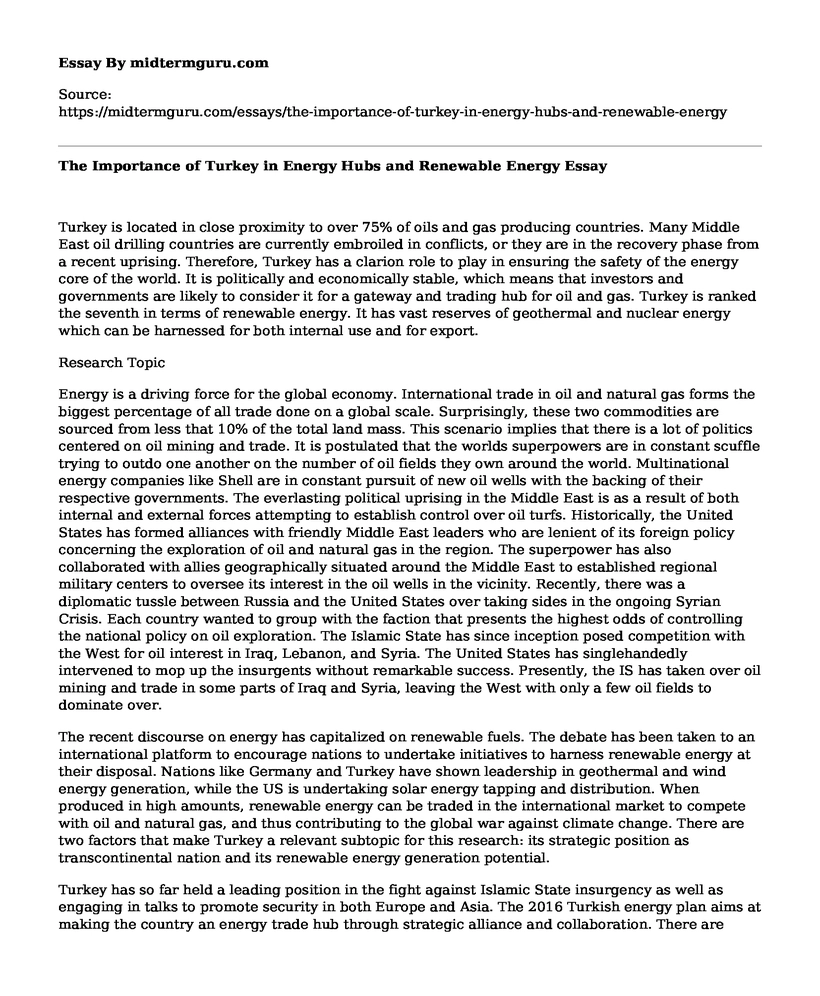Turkey is located in close proximity to over 75% of oils and gas producing countries. Many Middle East oil drilling countries are currently embroiled in conflicts, or they are in the recovery phase from a recent uprising. Therefore, Turkey has a clarion role to play in ensuring the safety of the energy core of the world. It is politically and economically stable, which means that investors and governments are likely to consider it for a gateway and trading hub for oil and gas. Turkey is ranked the seventh in terms of renewable energy. It has vast reserves of geothermal and nuclear energy which can be harnessed for both internal use and for export.
Research Topic
Energy is a driving force for the global economy. International trade in oil and natural gas forms the biggest percentage of all trade done on a global scale. Surprisingly, these two commodities are sourced from less that 10% of the total land mass. This scenario implies that there is a lot of politics centered on oil mining and trade. It is postulated that the worlds superpowers are in constant scuffle trying to outdo one another on the number of oil fields they own around the world. Multinational energy companies like Shell are in constant pursuit of new oil wells with the backing of their respective governments. The everlasting political uprising in the Middle East is as a result of both internal and external forces attempting to establish control over oil turfs. Historically, the United States has formed alliances with friendly Middle East leaders who are lenient of its foreign policy concerning the exploration of oil and natural gas in the region. The superpower has also collaborated with allies geographically situated around the Middle East to established regional military centers to oversee its interest in the oil wells in the vicinity. Recently, there was a diplomatic tussle between Russia and the United States over taking sides in the ongoing Syrian Crisis. Each country wanted to group with the faction that presents the highest odds of controlling the national policy on oil exploration. The Islamic State has since inception posed competition with the West for oil interest in Iraq, Lebanon, and Syria. The United States has singlehandedly intervened to mop up the insurgents without remarkable success. Presently, the IS has taken over oil mining and trade in some parts of Iraq and Syria, leaving the West with only a few oil fields to dominate over.
The recent discourse on energy has capitalized on renewable fuels. The debate has been taken to an international platform to encourage nations to undertake initiatives to harness renewable energy at their disposal. Nations like Germany and Turkey have shown leadership in geothermal and wind energy generation, while the US is undertaking solar energy tapping and distribution. When produced in high amounts, renewable energy can be traded in the international market to compete with oil and natural gas, and thus contributing to the global war against climate change. There are two factors that make Turkey a relevant subtopic for this research: its strategic position as transcontinental nation and its renewable energy generation potential.
Turkey has so far held a leading position in the fight against Islamic State insurgency as well as engaging in talks to promote security in both Europe and Asia. The 2016 Turkish energy plan aims at making the country an energy trade hub through strategic alliance and collaboration. There are currently a number of East-West gas corridors that facilitate transition of oil and natural gas from the Middle East and the Caspian to Europe. Some of the corridors like South Caucasus Pipeline (SCP) are already installed, while others like the Trans--Anatolian Natural Gas Pipeline (TANAP) are proposed. The government of Turkey has established the Energy Exchange Istanbul (EXIST) authority to oversee all international oil transaction held in the country. Turkey is also investing in top-of-the-range nuclear power plant that will be completed by 2023. The energy factories will be more efficient that either Fukushima or Chernobyl because they will be Generation III + level plants. Turkey has already started exploration of geothermal power in large scale which can be sold if produced in surplus.
Research Questions
In spite of Turkey serving as a busy energy trade market, the country is still reliant on crude oil imports from the Russian Federation. The national industrial output is not yet peaked due to low energy supply to fuel the industries. Therefore, this research seeks to answer the following question: Is the position of Turkey as an exchange center for oil and natural gas detrimental to its economy? The price of natural gas and crude oil keeps on fluctuating with time. It means therefore that it is a notoriously unreliable propellant of industrial growth, thus calling for expeditious implementation of renewable energy plans. So, what is the impact of Turkeys active trade in non-renewable energy to its renewable energy prospects?
Cite this page
The Importance of Turkey in Energy Hubs and Renewable Energy. (2021, May 26). Retrieved from https://midtermguru.com/essays/the-importance-of-turkey-in-energy-hubs-and-renewable-energy
If you are the original author of this essay and no longer wish to have it published on the midtermguru.com website, please click below to request its removal:
- Ecology Essay Example: Personal Position on Climate Change and Global Warming
- Structural Mitigation Over Non-structural Mitigation - Essay Sample
- Hurricane Scenario - Essay Sample
- Nature: Our Lifeline That Needs Preserving - Essay Sample
- Open Innovation: Unlocking Economic & Social Change in Africa - Essay Sample
- Smartphones: Blessing or Curse? - Essay Sample
- Animal Testing Should Be Banned - Argumentative Essay







